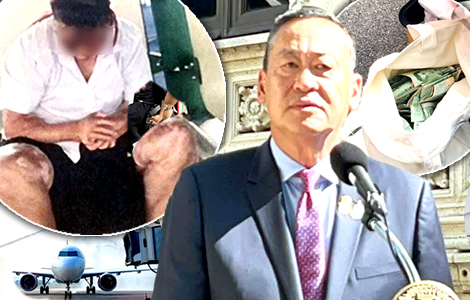Disfigured beggars flying into Suvarnabhumi Airport from China and staying in hotels while earning bags of cash concealed from kind-hearted passersby prompts Thai police to introduce screening of Chinese tourists to prevent further abuse.
The Metropolitan Police Bureau in Bangkok this week arrested six disfigured Chinese women who entered the kingdom in recent times as tourists and who were making well over ฿10,000 per day begging on the city’s streets. On Wednesday, Prime Minister Srettha Thavisin admitted that the government’s visa waiver scheme for Chinese tourists has been a disappointment as Chinese airlines cancel flight slots and ground facilities booked at Suvarnabhumi Airport.

Prime Minister Srettha Thavisin has accepted that some of the Chinese beggars seen in Bangkok this week, prompting an extensive police investigation, may have taken advantage of the country’s visa waiver scheme to boost foreign tourists from China.
The Prime Minister was speaking after he admitted that Chinese airlines have cancelled extra slots and ground services booked in advance at Suvarnabhumi Airport due to a lack of demand for the new airline routes that were planned to take advantage of the anticipated boom which has not materialised.
Pent-up demand in China overestimated by officials given the deteriorated economic situation in the Communist state and Beijing’s stay-at-home policy
The government leader told reporters that Thai officials may have overestimated the pent-up demand that there was in China and failed to appreciate the difficult economic conditions that now exist on the mainland in addition to the policy being pursued by Beijing encouraging its nationals to stay at home to support the Chinese economy.
The PM said the focus would now be on promoting the flow of Indian and Taiwanese foreign tourists as his government prepares a new visa scheme to entice tourists from Europe announced by key aide Dr Prommin Lertsuridej.
90-day visa for European travellers to boost confidence and goodwill damaged by pandemic
Mr Srettha was speaking in advance of a meeting with the National Police Chief General Torsak Sukwimol.
Range of security issues confront PM before meeting National Police Chief General Torsak Sukwimol including Chinese beggars seen on Bangkok’s streets
The meeting at Government House was called to address several issues that have arisen this week including the manhunt for a dangerous prisoner Mr Chaowalit Thongduang or Sia Paeng Nanod who escaped from prison in the southern province of Nakhon Si Thammarat some weeks ago and who is believed to be hiding out in a remote mountain range with a huge police manhunt on his tracks.
The Prime Minister also discussed the evacuation of Thai nationals from war-torn Myanmar and specifically asked for information on the discovery of the network of Chinese beggars reported on the streets of Bangkok this week, which has caused consternation among the Thai public.
The news emerged on Monday after a social activist reported to the Ministry of Social Development and Human Security as well as Bang Phlat Police in the northern part of central Bangkok, that deformed Chinese women dressed in Thai girls’ school uniforms have been seen begging on the streets at various points and intersections.
One Chinese woman had a bag of banknotes in the middle of the day with ฿10,400 already collected while her bowl contained only coins and some notes
Police arrested one of the women outside a department store in the Pinklao area of the city as she was begging near a pedestrian crossing.
The woman appeared to be in her 30s and afterwards when taken in for questioning, as begging in Thailand is illegal, told officers that she had suffered an acid and hot water attack in China while subsequently having her hands amputated.
Meanwhile, police found the woman with a flat bag, a chair and a money box containing coins as well as a room key card to a local hotel.
When offciers searched further they found the woman had a bag of ฿20 and 100 notes which amounted to a value of ฿10,400.
Her begging bowl meanwhile had coins and a few bank notes.
Beggar arrived in Thailand as a tourist on Friday, November 10th and was staying at a city centre hotel
She explained to officers that she had arrived alone in Thailand on November 10th and was not aware that begging on the streets in the kingdom was against the law.
She told them she was a divorcee who had two children in China whom she cared for.
Like others arrested by police this week, she was staying at a Bangkok hotel.
In the light of what police learned from Monday when an investigation was triggered by representations made by a leading social activist to the Ministry of Social Development and Human Security through the intervention by the minister, Mr Varawut Silpa-archa, measures are being taken to prevent this sort of activity
Mr Varawut issued a statement suggesting that the Chinese beggars seen in the city may be linked to human trafficking or organised crime.
A follow-up police operation led to the arrest of five other Chinese women, all wearing the same uniform, with a number of them staying together at the same hotel.
Chinese abusing Thailand’s welcome for tourists to break the law in the Kingdom is not new and has been rising for decades, well before the pandemic
Two Chinese nationals are reported to have escaped the police net and have gone to ground.
Chinese pickpockets staying in hostels as backpacker visitors targeting tourists in Bangkok
Chinese invasion claim by Chuwit saying there are now 3 million new arrivals in tourist hotspots
The news, this week, that Chinese beggars were using the country’s liberal new visa waiver scheme for tourists to beg for money on Thailand’s streets is not so surprising when compared with the range of criminality exported from China which has risen in recent years, a trend that goes back even before the pandemic when Chinese petty criminals including pickpockets were known by the Metropolitan Police Bureau in Bangkok to be targeting foreign tourist areas of the capital.
In June, Chuwit Kamolvisit, the country’s famous whistleblower and former Bangkok massage parlour boss described the phenomenon as a Chinese invasion involving millions of people.
Common modus operandi and dress suggested coordination between the Chinese beggars arrested this week by police and currently being held
All of the Chinese begging women arrested this week by police were booked into hotels in the city, which also suggested a common modus operandi.
All were wearing school uniforms playing on a well-known and supported trope in Thailand of poor people begging for alms to seek an education
Police at Phayathai Police Station, at the same time, arrested one of the women, a 33-year-old Chinese woman with a plastic begging bowl, who was brought in for questioning and was also found to have over ฿10,000 in small banknotes, which appeared to be the takings for the day until her arrest.
On Wednesday, Police Major General Amnat Traipote, the Deputy Commissioner of the Metropolitan Police Bureau, briefed reporters.
He confirmed that, over the previous few days, police had arrested six Chinese beggars in all, wearing similar clothing and having severe disfigurements.
Each was fined between ฿100 and ฿500 for begging and ordered deported from the kingdom while also being placed on a blacklist.
However, among reports this week from the police operations, it was suggested that at least one of the women had evaded a prior blacklisting from the country.
Police think this is not the work of a transnational human trafficking gang although the money being earned on Thailand’s streets is going to China
Police Major General Amnat told reporters that the female beggars were currently being held at the Immigration Bureau Detention Center in Sathorn Road, where police would interrogate them further before they are returned to China to find out more about the nature of this criminal network.
Significantly, the senior officer said all the women appear to have similar stories, explaining their disfigurement was caused by either some attack or by fire or an accident related to machinery or cars.
He said investigators were seeking further information at the hotels in the capital they had stayed in, including one shared by some of the women in the Wang Thonglang district of the city.
In addition, the senior police officer said investigators had concluded that this was not a case of transnational human trafficking although the money being raised by the women was being directed back to China.
Rather, the Thai police suspect the involvement or the assistance of local Thai people is being provided to the Chinese women.
New screening measures for Chinese tourists
He revealed that police had learned that one of the Chinese beggars had arrived in Thailand in June and applied for an online education course which she used to subsequently apply for a student visa to extend her stay in the country for one year.
The beggars targeted crowded places and tourist destinations in the centre of Bangkok.
They appear to have ways of converting banknotes into coins, although police have not yet determined how they converted their money into Yuan.
At this time, he explained that the Royal Thai Police would be implementing new measures to screen Chinese visitors with significant facial body disfiguration as they enter the country to ensure that they are not engaged in on-street begging.
Huge crackdown on begging saw 7,151 people hauled in by police in Bangkok, most of them being Thai but with foreigners mainly from Cambodia and Myanmar
In the meantime, the police together with the Ministry of Social Development and Human Security, this week, launched a crackdown on begging on Bangkok’s streets which has seen 7,151 people pulled in, of which 4,688 were Thai nationals.
Mr Sarawut Mulpho, the Welfare Protection and Life Quality Director at the Ministry of Social Development and Human Security, told reporters that, without a doubt, this activity has links to organised criminal gangs in Thailand.
However, he suggested that foreign beggars were using the government’s visa-free schemes to promote tourism, to enter the kingdom and exploit the goodwill of the Thai people to make money on the streets.
Prime Minister Srettha Thavisin, speaking to reporters on Wednesday, said the government would react decisively to the situation.
He was speaking before he met with the National Police Chief General Torsak.
He accepted that some of the beggars had entered the country as tourists and hence broke the law leading to their tourist visas being revoked.
Join the Thai News forum, follow Thai Examiner on Facebook here
Receive all our stories as they come out on Telegram here
Follow Thai Examiner here
Further reading:
Chinese police patrols plan dumped by ministers quickly after public backlash threatened to erupt
Police Chief rebuffs reports of Chinese Police being deployed to Thailand to protect tourists
Police chief confirms 2 dead with reports of at least one more fatality in Bangkok mass shooting
Police arrest Chinese kidnapper with similar details to an abduction for ransom case in April
New visa-free regime plan for Chinese tourists will see more criminal elements entering Thailand
Crackdown on crime wave against Chinese tourists in Bangkok as concerns also raised on cannabis
Chinese kidnapping victim held by Immigration police and facing extradition over fraud case


















